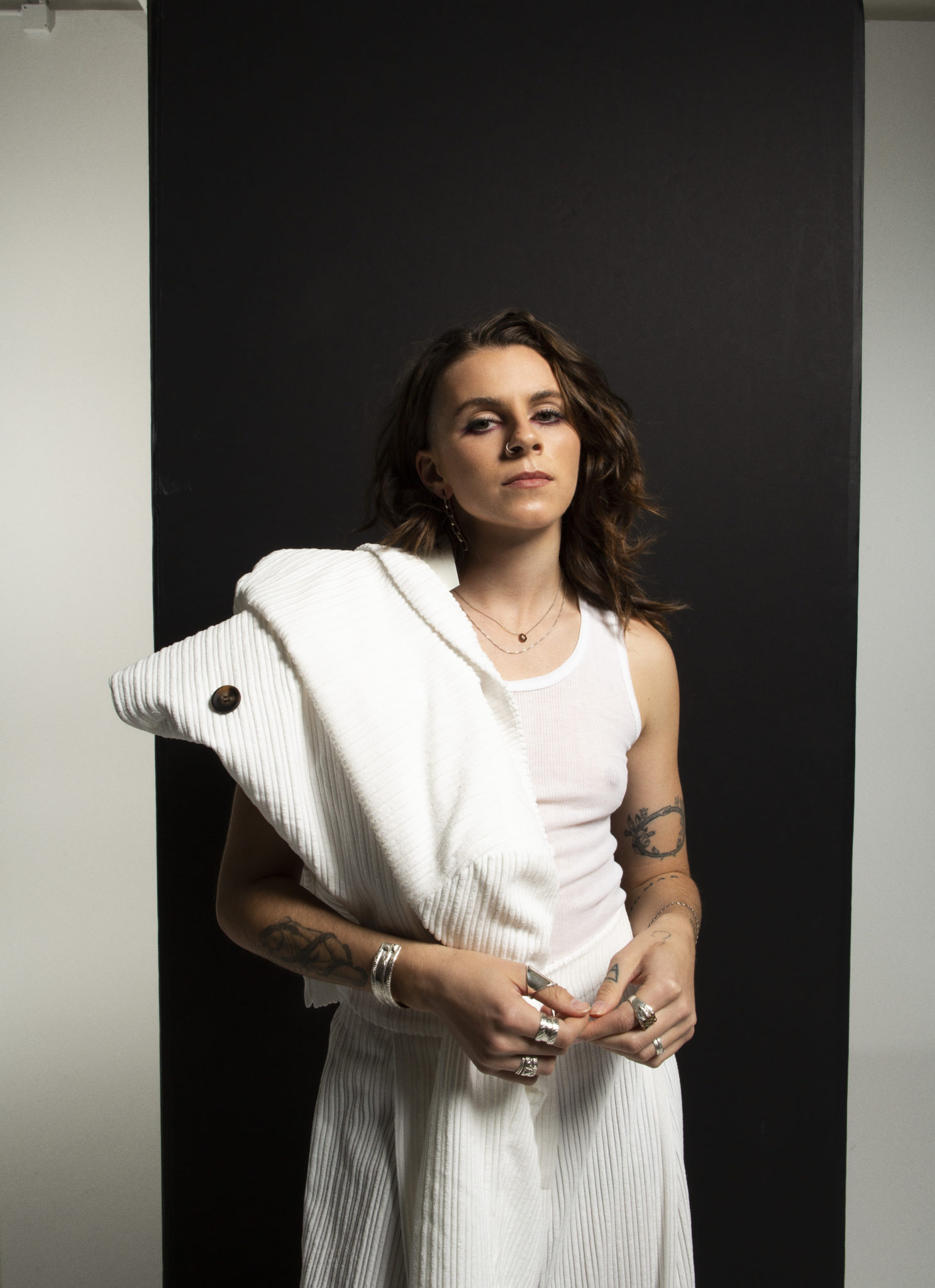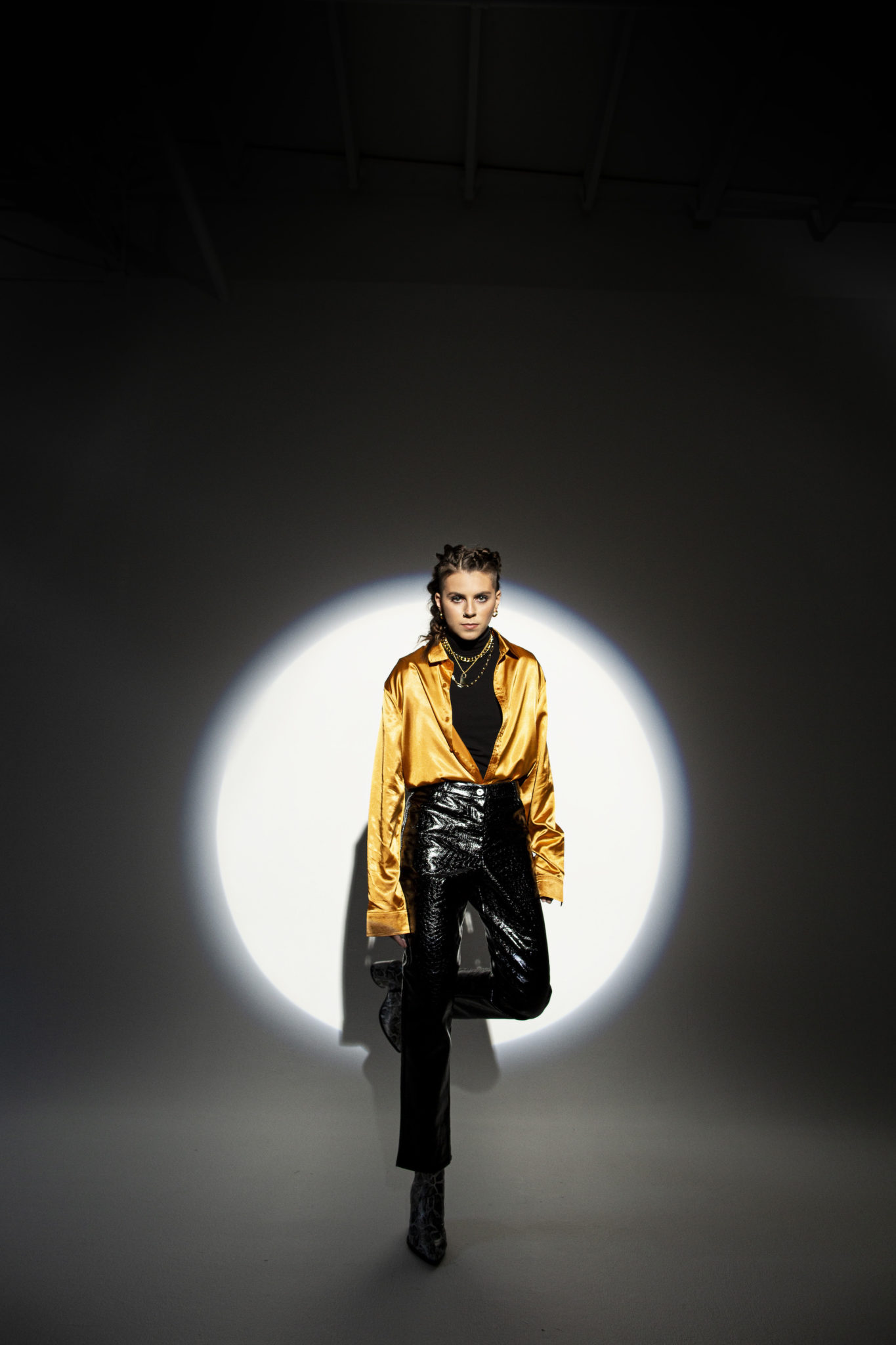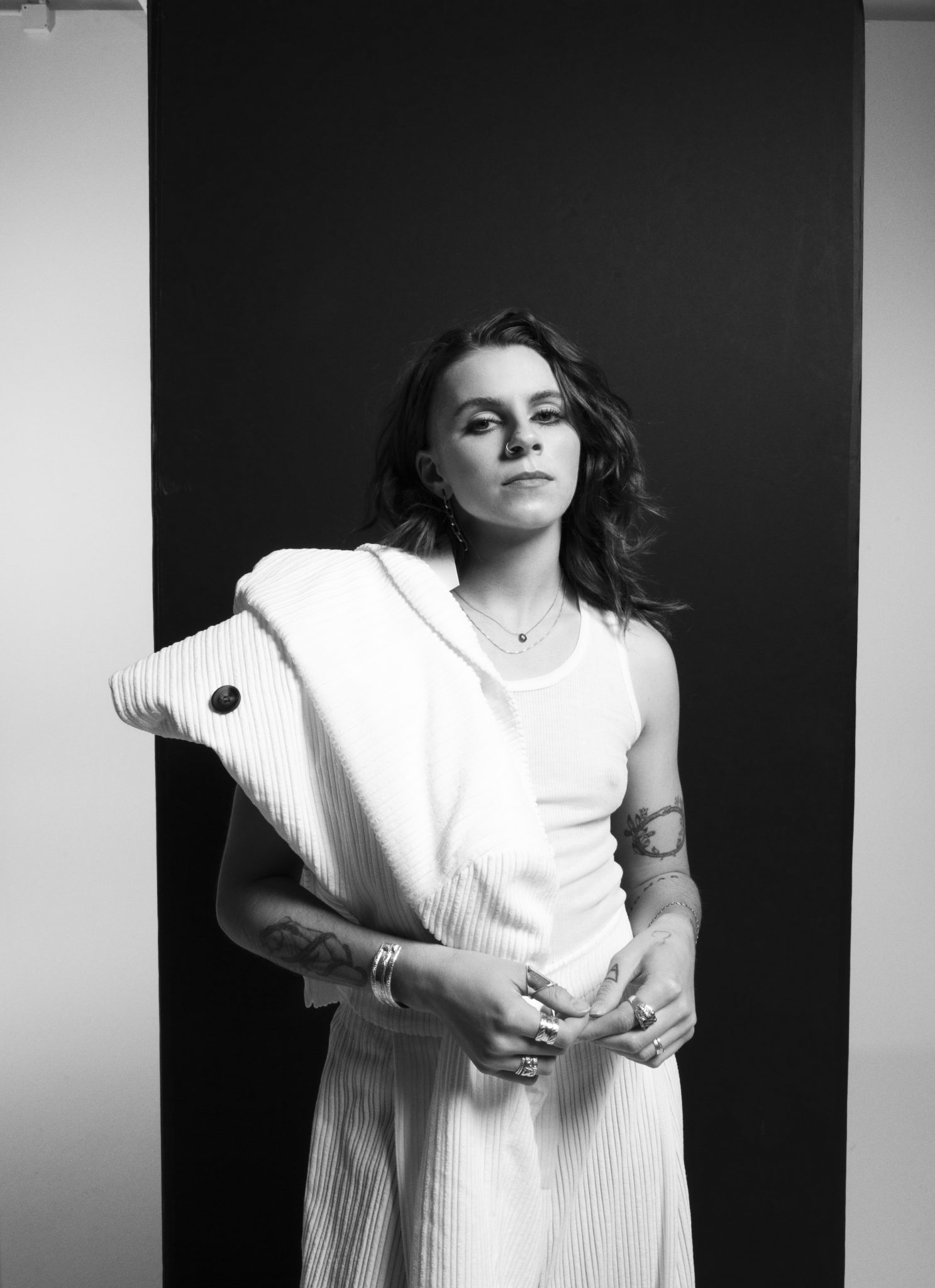Lynn Gunn Takes Control, Unapologetically
On her band PVRIS’s forthcoming album Use Me, Gunn’s commitment to self-love shines through.
Since PVRIS burst on the alt-rock scene in the mid-2010s, the band’s defining feature has arguably been frontwoman Lynn Gunn’s vocals. A forceful yet ethereal complement to the band’s dark sound, Gunn’s voice is unmistakable on hit tracks like 2014’s “You and I.” But after two albums, Gunn found her voice thwarted by multiple factors—ranging from institutional resistance to female-driven rock, to a recently diagnosed auto-immune disorder.
As the band’s songwriter and creative director, Gunn says she had to overcome the impulse to downplay her own authority. But now, ahead of the band’s long-awaited third album—Use Me, out May 1—Lynn is in full possession of her power. Below, Gunn talks to V about the album’s pop-driven sound, and claiming creative control by rediscovering self-love.
V This new album sounds a lot more ‘pop’ than your previous two records, White Noise (2014) and All We Know Of Heaven, All We Need Of Hell (2017). Is that a new route you’ve wanted to take with your music?
Lynn Gunn I’ve always wanted our music to lean pop: I’m very focused on melody and chord progression, and making sure those feel good and sound fresh. But there was also pressure to fit into a certain mold, based on the bands we [toured] with early on. So I haven’t always felt confident in taking it fully pop, but it’s always been a big focus.
V Has your role as the lead singer of PVRIS shifted over the years?
LG I’ve always been the band’s writer and creative director. I’ve even designed our merch [and] tour flyers. [Despite having a hand in] basically everything, I’ve always felt a deep shame and guilt with it, for some reason. Especially as a woman in a band with men, there’s this pressure to blend in and not be seen as “too much.” And that’s not on my [bandmates], but on society and people as a whole. But, right now it’s really important for any woman, and especially a woman doing the [a large] amount of work, to be open about [that work] and proud of it. With this album, I really wanted to shed any pressure to fit the “alternative” mold. To embrace what I’m doing, and not cheat myself or feel pressured [in any way].

V What does leading PVRIS, as a female, mean to you?
LG In the last two years, I had a lot of epiphanies and realizations about myself. I’ve given to people very freely, without ever expecting anything back. I don’t know where this came from, but I have a really hard time speaking up for myself. I’ve thought, “Make sure you’re not bragging about anything—just blend in and don’t make a scene.” Even before PVRIS, I’ve had that. I’m really timid about talking about [work]. Even on this call, I’m still feeling strange about it.
But now, I kinda wanna [talk about it]! I’ve realized it’s an act of self love. It’s like, Nope, it’s okay [to talk]. I hope that can benefit other people, especially young women who want to pursue music. That, not only can you do all of this, but you can also have really supportive and encouraging male bandmates, and team members that support you. It doesn’t need to be this weird power trip or made-up drama. If you really stick to your guns and do that with compassion and with empathy, and just be as communicative and transparent as possible with the people around you, you can very much do that and have that kind of power and be respected in the process.
V Did you experience any personal struggles while making the new album?
LG I always feel like it’s just an uphill battle constantly. I’m always swimming upstream. I have a really hard time asking for what I need. Even in albums or tour cycles prior… Like after our second record, I had vocal issues for the entire touring cycle but [I] pushed through it and made it work. There’s definitely a fine line that I’m always kind of walking as of like, “Am I okay? Am I in a good place to be doing this right now, or should I be concerned?”
I’m also dealing with a lot of health issues that I finally in the last two years got diagnosed, and [I’m] starting to slowly figure out how to manage them. Especially through having those health issues happening while trying to make the record and while trying to tour, it was an added-on layer of like, “How much is too much?”
V Can you talk about those health issues?
LG About two years ago, I found out that I have an autoimmune disease called ankylosing spondylitis. Basically, all of your joints and your spine and your ribs and like, all parts of your body can get really inflamed and really stiff and really painful. It’s chronic inflammation, and can really travel anywhere in your body. Then, this last October, I also found out I had Crohn’s disease. That was another thing that I was dealing with a lot; I couldn’t hold anything down because I was chronically tired and fatigued, and walking around light-headed all the time and I didn’t really know why.
It put a lot of pieces together: if [my] body is like a car, [I’m] driving a car right now that’s falling apart and not really working too well. But, it was a really good sense of clarity for a lot of things I’ve been dealing with for the last few years. I was managing that a lot while making this album—I was going into a lot of sessions and a lot of days at the studio just feeling like my head was floating off of my body. Just feeling very drained and very tired and not fully there. I think that translates into a lot of the music, and a lot of the songs—like, this perpetual tiredness and [feeling] like, “What the fuck is going on!”
V Do you consider this third album your breakthrough?
LG It’s always been very internal and it’s always been from my perspective since the beginning, but I think this is much more self-aware and integrating the entire picture now. Even musically, it’s translating to be a lot more personal, and is naturally just from me. On this album, I got to track everything: drums, guitar, bass, keys—and, have a big part in working on directing the production the way that I really wanted [the album] to go. I think it’s the closest it can actually get to being extremely personal—not just lyrically, but sonically as well.
V What do you hope people take away from listening to the album?
LG I hope people feel fired up. I hope it makes people feel powerful. I always want people to feel whatever they need to feel when they listen. The process for me was [all about] reminding myself of self-worth and self-care. And honoring the parts of myself that I felt like I had to hide or shrink down, for the comfort of peoples’ expectations. [It’s about] stepping into yourself and shedding old skin and stepping forward. This is where I am now.

